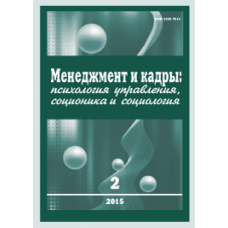Номер № 2/2015 журналу «Менеджмент і кадри: психологія управління, соціоніка та соціологія»
Нові технології
Литвиненко І.Ю.
Новий погляд на місію підприємства
Розглянуто поняття «місія підприємства»; його місії. Надано загальні концептуальні рекомендації для побудови місії підприємства з урахуванням мірності ФІМ у його інтегральному ТІМі, а також деякі рекомендації щодо особливостей кадрового менеджменту на підприємстві у зв'язку з виконанням ним своєї місії.Ключові слова: соціоніка, інформаційні аспекти, тип інформаційного метаболізму (ТІМ), місія підприємства.
Інструменти менеджменту
Гуленко В.В.
Екстраверти та інтроверти в робочих групах
Описані експерименти в порівнянні з активністю екстравертів і інтровертів у робочих групах під час вирішення поставлених задач.
Ключові слова: соціоніка, психологічний тип, екстраверсія, інтроверсія.
Джелалі В.І.
Управління стратегією інноваційного розвитку
Викладено необхідні основи дослідження та формування стратегії соціальних систем, зокрема, і для такої системи, як інноваційний сфера (розвиток).
Ключові слова: інноваційний розвиток, стратегія, системна повнота, стратегічне якісне прогнозування, інженерно-філософська методологія творення, фундаментальні дослідження.
Процес переходу від тоталітарних структур до ліберальних – одна з основних проблем пострадянських країн. такого переходу визначається значною мірою орієнтацією та особистістю політиків, які ініціюють політичні та соціальні процеси. Перебіг цих процесів нерівномірний у різних країнах СНД.
Питання профорієнтації
Захарова О.В.
Особливості профорієнтації етико-інтуїтивного екстраверта
Розглянуто соціонічна характеристика етико-інтуїтивного екстраверта з точки зору його сильних і слабких сторін, а також порушена проблематика вибору професії представниками даного типу на конкретному прикладі ТИМу (ЕІЕ).
Ключові слова: соціоніка, ТИМ, функції, етико-інтуїтивний екстраверт, «Гамлет», семантика аспектів, етика емоцій, інтуїція часу, інтуїція можливостей, логіка дій, сенсорика відчуттів, вольова сенсорика, структурна логіка, етика відносин, профорієнтація, самореалізація.
Методи соціоніки
Букалов А.В., Карпенко О.Б.
Соціоніка в академічних та прикладних дослідженнях
Широке поширення соціоніки як наукового напряму підтверджується тим, що за останні 15 років соціонічні ідеї та методи використані більш ніж у 800 дисертаціях з усіх розділів гуманітарних наук та в ряді технічних наук.Проведено аналіз таких дисертаційних робіт з галузей та тем. : соціоніка, психологія, менеджмент, соціологія, гуманітарні науки, технічні науки, педагогіка, економіка, філософія.
Педан Т.П.
Методи візуального типування
Описаний метод візуального типування. Його застосування може бути корисним для створення доказової. бази соціоніки, точної верифікації ТІМу, навчання основ соціоніки зі шкільного віку, широкого використання інструментарію соціоніки для покращення якості життя та гармонізації суспільства.
Ключові слова: аналіз, синтез, істина, відкриття, психіка, психологія, гармонійна психіка, психічне здоров'я, програма психіки, ТИМ, самопізнання, самореалізація, гармонізація відносин, візуальне типування, вроджені потреби, інформація, енергія, поле, акцентуація блоків, доказова база, комп'ютер, мозок, виховання, улюблена справа, близьке оточення, міцна сім'я.
Психологія особистості
Попов В.П., Крайнюченко І.В.
Свідомість, мислення, розум. Розглянуто поняття психіки, свідомості, інтелекту та мислення. процесів.
Ключові слова: психологія, нервова система, поведінка, психіка, свідомість, інтелект, мислення, пам'ять. Summary
Менеджмент і кадри 2/2015
- Модель: выпуск журнала «Менеджмент и кадры…»
-
$3.00
- Ціна в бонусних бали: 30

